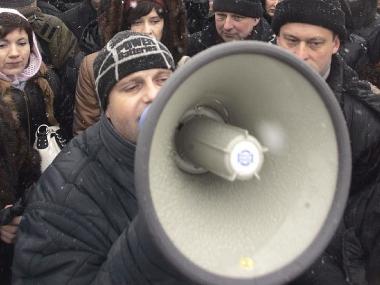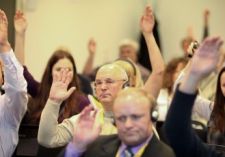 It was not the first court hearing featuring “Movement Forward,” a parent entity for “Speak the Truth” civil campaign. This time around activists made an attempt to appeal the previous court decision, on 12 October by Judge Andrei Rybalkin, effectively annulled the office rent agreement between Movement and its renter.
It was not the first court hearing featuring “Movement Forward,” a parent entity for “Speak the Truth” civil campaign. This time around activists made an attempt to appeal the previous court decision, on 12 October by Judge Andrei Rybalkin, effectively annulled the office rent agreement between Movement and its renter.
Having no legal address “Movement Forward” automatically risked losing the official state registration. To Movement representatives the official reasons given by the court looked rather absurd and had clear political motivation.
‘Homeless’ NGOs have no rights
According to an HR defender and a lawyer Raisa Mikhailouskaya, such court decision directly contradicts the Economic Law of Belarus. “Belarusian legislative acts do not contain any norms, which regulate legal address acquisitions. In practice legal entities are supposed to have an office space with an address, and it should not matter, which purpose this space serves.”
She explained that the law does not prescribe where exactly a certain entity should be located: an educational establishment does not really need an auditorium or a trading company has no obligation to establish a store. Nevertheless, for “Speak the Truth” and its parent NGO the law was interpreted with some very eerie exceptions.
Thus, having lost its legal address “Movement Forward” is at serious risk of its state registration being revoked. It is not the first time the Belarusian authorities use this particular tactic against NGOs. Across the country many pro-democracy organisations and initiatives first became homeless and later got closed, forcing activists to work outside the law.
Campaign undercurrents “Speak the Truth” leader Uladzimir Niakliayeu confessed that numerous court hearings take away his time and energy from the presidential race. “Perhaps, it could be their main goal,” the hopeful candidate about authorities’ harassments.
“Speak the Truth” leader Uladzimir Niakliayeu confessed that numerous court hearings take away his time and energy from the presidential race. “Perhaps, it could be their main goal,” the hopeful candidate about authorities’ harassments.
Other pro-democracy candidates could share quite similar stories. Although the government declared this campaign to be “most liberal and open,” activists are routinely persecuted and harassed by authorities of all levels. The observers of the campaign "Human Rights Defenders for Free Elections" report an increased number of incidents of direct and indirect pressure on members of initiative groups of certain candidates and activists of the independent civil society.
In the context of a lacklustre liberalisation, which the authorities are trying to sell to domestic and foreign public, the essence and character of an authoritarian regime do not change: truly independent and properly functioning civic initiatives and organisations in Belarus remain a distant and unattainable perspective.
Lapdog civil society
What more characteristic of this presidential campaign is the attempt by the regime to create a loyal and approving civil society, which could be easily ruled if not by an iron fist than by an executive decree.
On 14 November 2010, the National conference on the results of studies of the Civil Society Index in the Republic of Belarus took place in Minsk. In cooperation with the Presidential Administration, the organizers undertook an attempt to create a National platform of civil society, as well as a human rights platform. Thus, the regime took a top-down approach at organising civil society in Belarus.
What even more peculiar is that such platforms already exist in Belarus. For years now the Belarusian NGOs have been contacting each other, exchanging ideas and working on common goals towards free and open society for all. Obviously, they could not turn blind on a less than strong HR and democratic record of the current regime. That was why there was a need to create yet one more pro-governmental dysfunctional entity, such as this National platform.
Yet in a joined address by several HR and civic organisations signatories declared that if the Belarusian authorities express their consent and desire to cooperate with human rights organizations, they will be ready for such cooperation. Human rights defenders will continue their work in order to strengthen human rights and development of democracy.
Freedom of association
Organized groups of independently-thinking citizens are viewed as a threat by the government, especially against the presidential campaign background. The Presidential election in Belarus is due on 19 December.
Many political, civil and human rights organizations, like human rights centre Viasna and Belarusian Christian Democracy party have been repeatedly denied formal registration by Belarusian authorities, though are actually existing and functioning.
 At the same time, activists of unregistered NGOs are under constant threat. The Criminal Code of Belarus still contains provisions making the criminal prosecution of members of unregistered NGOs possible. The notorious Article 193.1 is suggesting imprisonment for up to two years for this “offence”. Despite numerous calls and vows the government has not taken any practical measures to repeal the provision.
At the same time, activists of unregistered NGOs are under constant threat. The Criminal Code of Belarus still contains provisions making the criminal prosecution of members of unregistered NGOs possible. The notorious Article 193.1 is suggesting imprisonment for up to two years for this “offence”. Despite numerous calls and vows the government has not taken any practical measures to repeal the provision.





